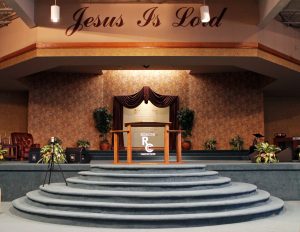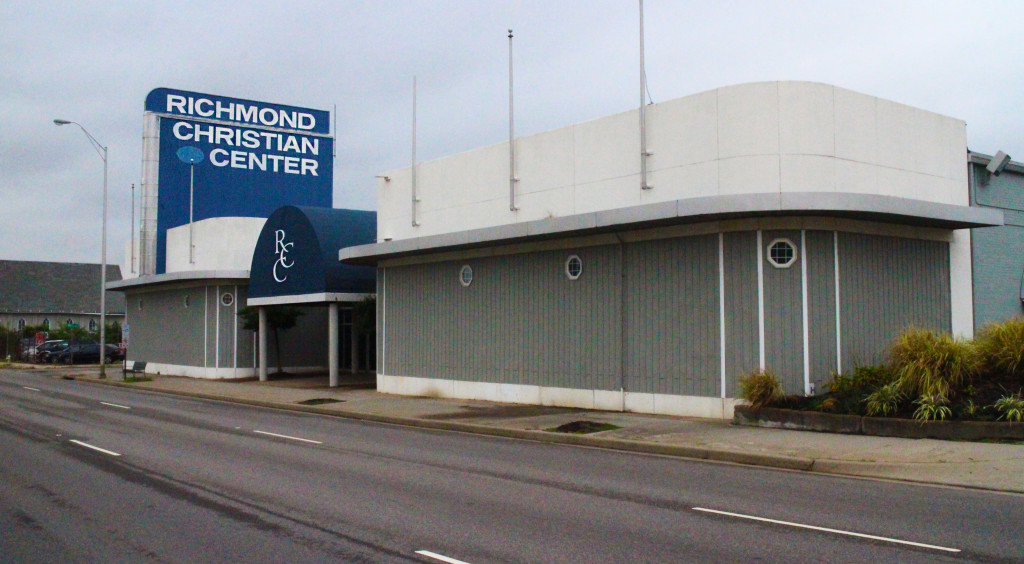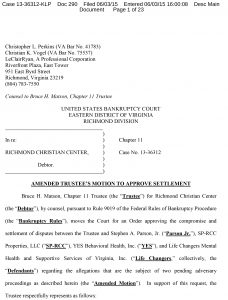A big check and a set of HVAC units have helped a bankrupt local church and the son of its pastor settle their differences. But the pastor himself isn’t yet off the hook.
Richmond Christian Center, which has been trying to work its way out of Chapter 11 bankruptcy since late 2013, entered into a settlement last week with Stephen A. Parson Jr. and several of his business entities.
The agreement puts an end to Parson’s involvement in two disputes over proceeds from his sale of former church land and allegedly unauthorized transfers of church assets after it was already in bankruptcy.

The Richmond Christian Center was originally auctioned off late last year, but the highest bidder recently pulled out of the deal.
The settlement calls for him to pay $320,000 to Richmond Christian Center’s bankruptcy estate, which is overseen by trustee Bruce Matson. He must also return, at his own expense, several heating and air conditioning units to the grounds of the church’s main building at 214 Cowardin Ave.
In exchange, all claims against Parson and his SP-RCC Properties LLC, YES Behavioral Health Inc., and Life Changers Mental Health and Supportive Services of Virginia Inc. will be dismissed from the two civil cases.
“It’s good for Parson Jr. and it’s good for the church,” said Leonard Starr, a local attorney representing Parson in the matter.
The first case was filed in May 2014 and sought to recoup money from Parson’s sale of the land at 17 Cowardin Ave. The church had previously sold the land to Parson on the cheap, and he subsequently sold it to the developer of a large self-storage facility that’s currently under construction on the site.
The second dispute, filed in March of this year by the trustee, named Parson, his brother Mark, and his father Stephen Parson Sr., among others, as defendants. The case sought to recover up to $3 million for the bankruptcy estate and alleged that the defendants may have used the church’s assets to acquire cars, real estate and offshore accounts.
The case argues that the transfers of funds were not in the usual course of the church’s business and were made without the bankruptcy court’s permission, a necessary step while the organization remains in Chapter 11.
Court records show that Stephen Parson Sr. and Mark Parson were not included in the recent settlement, and the claims against them in the case will continue to be heard.
The elder Parson could not be reached for comment, and an attempt to leave a message at the church last week was unsuccessful.
The younger Parson’s business entities were also targeted in the second case for alleged lease violations. The companies had agreements to lease some of the real estate RCC owned around its Cowardin Avenue church and to make the monthly rent payments directly to the church’s main lender, Foundation Capital Resources. Those payments were abruptly stopped in April 2013, the case alleged, and more than $3 million in rent and late fees were owed.
In explaining the decision to settle the cases with Stephen Parson Jr., the trustee stated in court documents that he “concluded that the proposed settlement is in the best interests of the debtor and its creditors, considering, among other things, the defenses asserted by the defendants in the adversary proceedings and the cost, expense and delay associated with litigating the matter, the result of which is uncertain.”
Matson, who did not return a call last week, has said that the RCC congregation still has a few hundred active members, and it still actively holds services at the Cowardin facility each week. He has been working to craft a plan to put the church back on stable financial ground that would include leasing out some of its surplus space to outside businesses.
Starr said he expects a Chapter 11 reorganization plan will be filed by the church in the next month or so.
“I’m hopeful and so is Mr. Parson Jr. that the church is going to get a fresh start and move forward,” Starr said. “They have a core group that has held on through all of this controversy.”
A big check and a set of HVAC units have helped a bankrupt local church and the son of its pastor settle their differences. But the pastor himself isn’t yet off the hook.
Richmond Christian Center, which has been trying to work its way out of Chapter 11 bankruptcy since late 2013, entered into a settlement last week with Stephen A. Parson Jr. and several of his business entities.
The agreement puts an end to Parson’s involvement in two disputes over proceeds from his sale of former church land and allegedly unauthorized transfers of church assets after it was already in bankruptcy.

The Richmond Christian Center was originally auctioned off late last year, but the highest bidder recently pulled out of the deal.
The settlement calls for him to pay $320,000 to Richmond Christian Center’s bankruptcy estate, which is overseen by trustee Bruce Matson. He must also return, at his own expense, several heating and air conditioning units to the grounds of the church’s main building at 214 Cowardin Ave.
In exchange, all claims against Parson and his SP-RCC Properties LLC, YES Behavioral Health Inc., and Life Changers Mental Health and Supportive Services of Virginia Inc. will be dismissed from the two civil cases.
“It’s good for Parson Jr. and it’s good for the church,” said Leonard Starr, a local attorney representing Parson in the matter.
The first case was filed in May 2014 and sought to recoup money from Parson’s sale of the land at 17 Cowardin Ave. The church had previously sold the land to Parson on the cheap, and he subsequently sold it to the developer of a large self-storage facility that’s currently under construction on the site.
The second dispute, filed in March of this year by the trustee, named Parson, his brother Mark, and his father Stephen Parson Sr., among others, as defendants. The case sought to recover up to $3 million for the bankruptcy estate and alleged that the defendants may have used the church’s assets to acquire cars, real estate and offshore accounts.
The case argues that the transfers of funds were not in the usual course of the church’s business and were made without the bankruptcy court’s permission, a necessary step while the organization remains in Chapter 11.
Court records show that Stephen Parson Sr. and Mark Parson were not included in the recent settlement, and the claims against them in the case will continue to be heard.
The elder Parson could not be reached for comment, and an attempt to leave a message at the church last week was unsuccessful.
The younger Parson’s business entities were also targeted in the second case for alleged lease violations. The companies had agreements to lease some of the real estate RCC owned around its Cowardin Avenue church and to make the monthly rent payments directly to the church’s main lender, Foundation Capital Resources. Those payments were abruptly stopped in April 2013, the case alleged, and more than $3 million in rent and late fees were owed.
In explaining the decision to settle the cases with Stephen Parson Jr., the trustee stated in court documents that he “concluded that the proposed settlement is in the best interests of the debtor and its creditors, considering, among other things, the defenses asserted by the defendants in the adversary proceedings and the cost, expense and delay associated with litigating the matter, the result of which is uncertain.”
Matson, who did not return a call last week, has said that the RCC congregation still has a few hundred active members, and it still actively holds services at the Cowardin facility each week. He has been working to craft a plan to put the church back on stable financial ground that would include leasing out some of its surplus space to outside businesses.
Starr said he expects a Chapter 11 reorganization plan will be filed by the church in the next month or so.
“I’m hopeful and so is Mr. Parson Jr. that the church is going to get a fresh start and move forward,” Starr said. “They have a core group that has held on through all of this controversy.”

